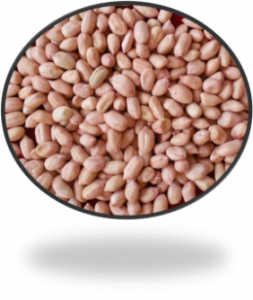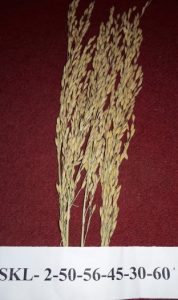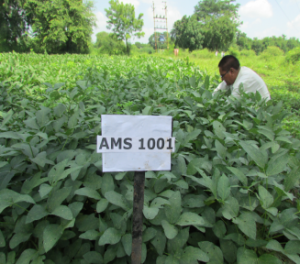About Department
The department of Agriculture Botany was established in the year 1970 under Post Graduate Institute, Dr. PDKV, Akola. M.Sc. and Ph.D. courses were started in Genetics and Plant Breeding, Plant Physiology, Seed Technology.
At present intake capacity of the students is as below
| Sr. No. | Subject | Present Intake Capacity | |
| M.sc | Ph.D. | ||
| 1 | Genetics and Plant Breeding | 13 | 03 |
| 2 | Physiology | 05 | 03 |
| 3 | Seed Technology | 05 | – |
| Total | 23 | 06 | |
Historical Perspective of the Department
Department of Agril. Botany established in the year 1970 under Post Graduate Institute, Akola. Since establishment this department runs M.Sc. (Agri.) degree programme in the subject of Agricultural Botany (Genetics and Plant Breeding, Plant Physiology, Seed Technology and Biotechnology). Ph. D. Degree programme with specialization in Genetics and Plant Breeding as well as in Plant Physiology by course work and research was started from 1986.
| P.G. specialization in Agril. Botany | M.Sc. (Agriculture) | Ph.D. |
| Since 1970 | ||
| a) Genetics and Plant Breeding | 06 | — |
| b) Plant Physiology | 02 | — |
| Since 1996 | ||
| a) Genetics and Plant Breeding | 08 | 02 |
| b) Plant Physiology | 04 | — |
| Since 2000 | ||
| a) Genetics and Plant Breeding | 12 | 02 |
| b) Plant Physiology | 04 | 02 |
| c) Seed Technology | 03 | — |
| d) Agricultural Biotechnology | 12 | 03 |
| Since 2010 | ||
| a) Genetics and Plant Breeding | 13 | 03 |
| b) Plant Physiology | 06 | 02 |
| c) Seed Technology | 05 | – |
| d) Agricultural Biotechnology | 12 | 03 |
Academic Programmes
- M. Sc. in Genetics & plant breeding
- M. Sc. in plant physiology
- M. Sc. in seed technology
- Ph. D. in Genetics & plant breeding
- Ph. D. in plant physiology
M.Sc. Courses:
- Core courses (Total Credits-20)
- Minor Courses (Total Credits-10/12)
- Supporting Courses (Total Credits-06)
- Research (Total Credits-20)
- Seminar (Total Credits-01)
Course Structure at a Glance
M.Sc.(Agri.) : GENETICS AND PLANT BREEDING
| Course No. | COURSE TITLE |
CREDITS |
| GP-501 | Principles of Genetics | 2+1 |
| GP-502 | Principles of Cytogenetics | 2+1 |
| GP-503 | Principles of Plant Breeding | 2+1 |
| GP-504 | Principles of Quantitative Genetics | 2+1 |
| GP-505 | Mutagenesis and Mutation Breeding | 2+1 |
| GP-506 | Population Genetics | 1+1 |
| GP-507 | Heterosis Breeding | 1+1 |
| GP-508 | Cell biology and Molecular Genetics | 2+1 |
| GP-509 | Biotechnology for Crop Improvement | 2+1 |
| GP-510 | Breeding for biotic and abiotic stress resistance | 2+1 |
| GP-511 | Breeding cereals, forages and sugarcane | 2+1 |
| GP-512 | Breeding legumes, oilseeds and fibre crops | 2+1 |
| GP-513 | Breeding for quality trains | 1+1 |
| GP-514 | Gene regulation and expression | 2+0 |
| GP-515 | Maintenance breeding, concepts of variety release and seed production | 1+1 |
| GP-516 | Germplasm collection, exchange and quarantine | 2+1 |
| GP-517 | Data base management, evaluation and utilization | 2+1 |
| GP-591 | Master’s seminar | 1+0 |
| GP-599 | Master’s research |
20 |
M.Sc.(Agri.) : Plant Physiology
| Course No. | Course Title | Credits |
| PP-501* | Principals of Plant Physiology | 3+1=4 |
| PP-511 | Mineral Nutrition | 2+1=3 |
| PP -508* | Morphogenesis Tissue culture and Transformation | 2+1=3 |
| PP-502* | Plant Developmental Biology Physiological and molecular basis | 2+0=2 |
| PP-503* | Physiological & molecular responses of plants to abiotic stresses | 2+1=3 |
| PP-504* | Hormonal Regulation of Plant growth and development | 2+1=3 |
| PP -506* | Physiology of Growth, Yield and Modeling | 1+1=2 |
| PP-591 | Masters Seminar | 0+1=1 |
M.Sc.(Agri.) : Seed Science & Technology
| Course No. | Course Title | Credits |
| SST-501 | Floral Biology, Seed development & maturation | 1+1=2 |
| SST-502 | Principles of Seed Production | 2+0=2 |
| SST-506 | Seed legislation & certification | 2+1=3 |
| SST-509 | Seed Physiology | 2+1=3 |
| SST-503 | Seed Production in field crops | 2+1=3 |
| SST-508 | Seed quality testing | 2+1=3 |
| SST-507 | Seed Processing & Storage | 2+1=3 |
| SST-515 | Emerging Trends in seed quality enhancement. | 1+1=2 |
| SST-591 | Masters Seminar | 0+1=1 |
Ph.D. Courses:
- Core courses (Total Credits-18)
- Minor Courses (Total Credits-10)
- Supporting Courses (Total Credits-05)
- Research (Total Credits-45)
- Seminar (Total Credits-02)
Ph.D. (Agri.) : Genetics and Plant Breeding
| Course No. | Course Title | Credits |
| GP-601 | Plant genetic resources and their utilization | 2+0 |
| GP-602 | Advances in quantitative genetics | 2+1 |
| GP-603 | Genomics in crop improvement | 2+1 |
| GP-604 | Cellular and chromosomal manipulations in crop improvement | 2+1 |
| GP-605 | Advances plant breeding systems | 2+0 |
| GP-606 | Crop evolution | 2+1 |
| GP-607 | Breeding designer crops | 1+1 |
| GP-608 | Advances in breeding of major field crops | 3+0 |
| GP-609 | Microbial genetics | 2+1 |
| GP-610 | In situ and ex situ conservation of germplasm | 2+1 |
| GP-691 | Doctoral seminar I | 1+0 |
| GP-692 | Doctoral seminar II | 1+0 |
| GP-699 | Doctoral research | 45 |
Ph.D. (Agri.) : Plant Physiology
|
Code |
Course Title | Credits |
| PP-604 | Techniques in Plant Physiology | 1+2=3 |
| PP-609 | Advances in Crop Physiology | 2+0=2 |
| PP-610 | Nitrogen metabolism | 2+1=3 |
| PP-605 | Climate change and Crop growth | 2+0=2 |
| PP-606 | Post harvest physiology | 2+0=2 |
| PP-607 | Weed physiology and herbicide action | 1+1=2 |
| PP-608 | Seed Physiology | 2+1=3 |
| PP-691 | Doctoral Seminar-I | 0+1=1 |
| PP-692 | Doctoral Seminar-II | 0+1=1 |
Infrastructure Facilities
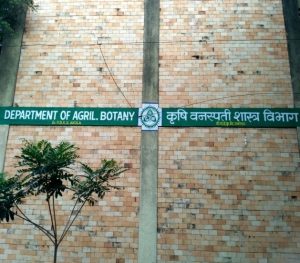
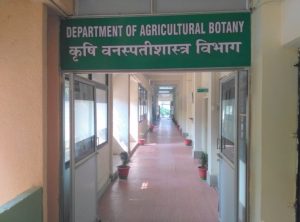
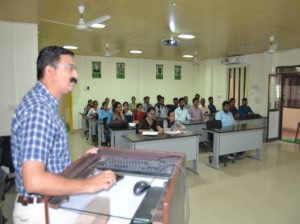
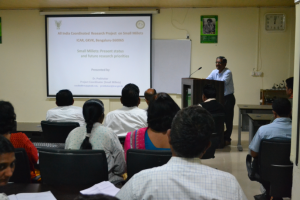
Smart Classroom

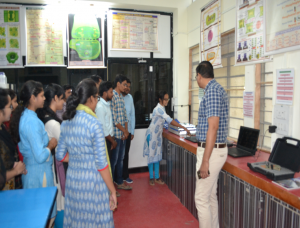
Laboratory of Genetics & Plant Breeding Laboratory of Plant Physiology


Departmental Digital library
Classrooms and Laboratories:
There are two classrooms and two functionallaboratories in the department of Agril. BotanyLaboratories areequipped with all scientific equipment’s for carrying out the basic research activities.
Plant Breeding Laboratory
| Sr.
No. |
Name | Quantity Available |
| 1 | Refrigerators | 2 |
| 2 | Water baths | 1 |
| 3 | Hot air oven | 1 |
| 4 | Shakers | 1 |
| 5 | Compound microscopes | 2 |
| 6 | Research microscopes | 20 |
| 7 | Micropipettes | 5 |
| 8 | Laminar Flow Work Stations | 2 |
| 9 | Magnetic Stirrers | 1 |
| 10 | Filtration systems | 1 |
| 11 | Analytical /digital balance | 1 |
| 12 | pH meter | 1 |
| 13 | Distillation Apparatus | 1 |
Crop Physiology Laboratory
| Sr. No. | Name of equipment | Equipment available |
| 1 | Spectrophotometer | 1 |
| 2 | Flame photometer | 1 |
| 3 | BOD Incubator | 1 |
| 4 | Electronic balance | 1 |
| 5 | Hot air oven | 1 |
| 6 | Leaf area meter | 1 |
| 7 | Distilled water assembly | 2 |
| 8 | Calcium/Magnesium meter | 1 |
| 9 | Grinding machine | 1 |
| 10 | Muffle furnace | 1 |
- Quality education to the M.Sc. &Ph.D students.
- Development of high yielding varieties/hybrids of different crops having resilience to climate change.
Research Activities
Thrust Area:
- Conservation of Biodiversity
- Maintenance and evaluation of germplasm
- Development of genotypes of different crops for special traits(quality, quantity, resistant/tolerance to various pests/ diseases and abiotic stresses) including climatic change
- Development of genotypes resilience to climatic change
- Breeding for mechanical harvesting
Varieties/hybrids Released During the last 5 years by Department of Botany, Dr. PDKV, Akola
| Sr. No. | Crop | Name of Variety/hybrid | Year of Release |
| 1 | Black Gram | AKU 10-1 | 2014-15 |
| 2 | PDKV Black Gold | 2014-15 | |
| 3 | Pigeonpea | AKPHM 11303 | 2014-15 |
| 4 | Cotton | AKH-9916 | 2014-15 |
| 5 | AKA-2005-3 | 2014-15 | |
| 6 | Sorghum | CSH 35 (National level) | 2015-16 |
| 7 | AKSV 181 | 2015-16 | |
| 8 | Wani 103 | 2015-16 | |
| 9 | Wheat | PDKV Sardar | 2015-16 |
| 10 | Sunflower | PDKVSH 952 | 2015-16 |
| 11 | Sorghum | PDKV Kartiki | 2016-17 |
| 12 | Chickpea | AKG 1109 | 2016-17 |
| 13 | Paddy | SKL 9 | 2016-17 |
| 14 | Groundnut | AKG 335 | 2016-17 |
| 15 | Soybean | AMS 1001 | 2017-18 |
| 16 | Paddy | PDKV Tilak | 2017-18 |
| 17 | SKL-10 | 2017-18 |
Research Achievements
Varieties Released :
|
SORGHUM |
||
| Wani 103 (PDKV Kartiki) | · In university multilocation trial PDKV Kartiki recorded 45.10% and 26.92% higher green hurda yield over the local check MalkapurWani and PDKV Ashwini respectively.
· The organoleptic properties like aroma, taste and other traits like color, size and shape of the proposed variety is found excellent. · Wani 103 (PDKV Kartiki) has got good and easy threshability. · Wani 103 (PDKV Kartiki) has got good disease and pest reaction which is comparable to both the checks. · In agronomic trial the Wani 103 (PDKV Kartiki) has shown fertilizer responsiveness to various fertilizer levels. · In economic analysis, Wani 103 (PDKV Kartiki) has recorded the highest B:C ratio of 8.13 · In adoptive trials over the farmers fields, Wani 103 (PDKV Kartiki) has shown the increased green hurda yield over local check MalkapurWani by 121.49% and over the last release PKV Ashwini by 40.55%. |
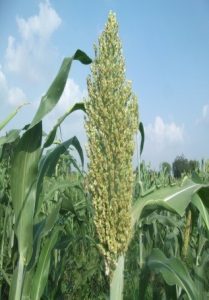 |
| Ground Nut | ||
| AKA-335 | · In overall trials conducted the proposed variety AK 335 recorded 19.2 % increase over AK 159 (ZC), 22.1 % over TAG 24 (ZC) and 15.8 % over JL 24.
· In the University Multilocation varietal trials AK 335 has recorded higher pod yield potential. It has shown an increase in pod yield by 18.0 % over check AK 159, 19.0 % over TAG 24 and 15.8 % over JL 24. · AK 335 has moderate resistance to major diseases (Tikka & Collar rot) · AK 335 has moderate resistance to major pests (Jassid, thrips& Aphids). · Also suitable to grow in rabi-summer season for seed production purpose.
|
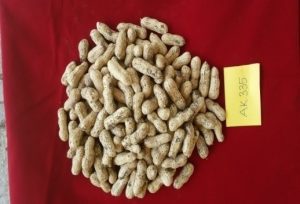
|
| MUSTARD | ||||
| MSTPDKV
-108-1 |
· State Mustard TPDKV 108-1 has 15.7 % increased seed yield over Shatabdi,, 21.7% over Pusa bold and 18.8% over National check Kranti in Multilocation varietal trials of the University.
· The proposed variety State Mustard TPDKV 108-1 has recorded higher yield potential. It has recorded yield of 3241 kg/ha as reported at SardarKrushinagar. · State Mustard TPDKV 108-1 has 35.6 % increased seed yield over Shatabdi,, 36.7 over Pusa bold and 34.1% over National check Kranti · State Mustard TPDKV 108-1 has 31.7 % increased oil yield over Shatabdi,, 46.4% over Pusa bold and 47.4% over National check Kranti
|
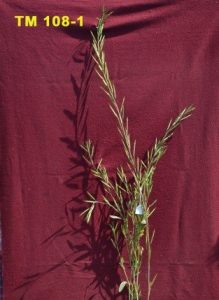
|
||
| Paddy | ||||
| SKL-2-50-56-45-30-60 (Sakoli-9) | · Midlate duration (130-135 days)
· Medium slender grains with test weight 19.06 g. · In University station trial SKL-2-50-56-45-30-60 rice culture has given 23.18% & 39.76% (IVT-2010) and 20.66% & 45.94% (AVT-2011) grain yield superiorly over check variety PKV HMT and state ch. RP-4-14 respectively. · 28.4% and 15.8% yield advantage over Vidarbha check variety PKV HMT and State check variety RP-4-14 respectively in Vidarbha Region in Maharashtra State Co-ordinated trial. 28.4% and 3.41% yield advantage on overall mean of three years over Vidarbha check variety PKV HMT and State check variety RP-4-14 in Maharashtra State Co-ordinated trial (Midlate). · 29.42% and 7.63% yield advantage over local check and national check NDR-359 in Maharashtra state in All India Co-ordinated trial · High head rice recovery (> 64%), good cooking quality and intermediate AC (22.55%). · Promising culture to stem borer. · Average grain yield 3873 kg/ha. · Average grain yield 4259 kg/ha. in adaptive trial |
|
||
| PDKV TILAK
(SYE- 503-78-34-2)
|
1. Duration : 140-145 Days to seed Maturity (Late Duration)
2. Fine grain type (Short Slender) 3. Test weight – 11.96 g 4. Good cooking quality and intermediate Amylose content (22.26 %) 5. High milling (70.40 %) 6. Head recovery (58.5 %) 7. Moderately resistant to Plant hopper and Gall midge and moderate reaction to neck blast |
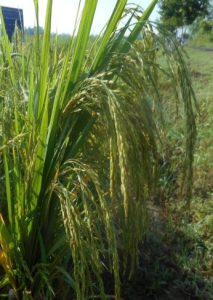 |
||
| SOYBEAN | ||
| AMS-1001 | 1. High yield potential –
2. In MVT AMS 1001 has shown 24.17 % and 20.58 % increase seed yield over state check MAUS-71 and JS-335 respectively. 3. In SMVT it has shown 36.01%, 30.58 % and 33.82% increase seed yield over JS-335,JS-97-52 and MAUS-71 respectively. 4. In AICRP trial AMS-1001 has shown an increase in seed yield by 46.71 % over JS 95-60, 38.29 % over JS 93-05 and 12.91 % over JS-335. 5. Resistant to Rhizoctonia root rot and Yellow mosaic virus in natural field condition. 6. Moderate resistant to Girdle beetle and Stemfly and tolerant to leaf defoliator. 7. Medium maturity duration (96 days) 8. Pod shattering resistance up to 10 days from harvest maturity. 9. Trypsin inhibitor contained in this variety has found less (35.79%) than JS 335 (39.77%) and JS 93-05 (39.96%) |
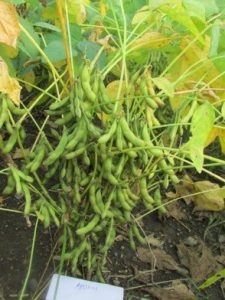
|
| SUNFLOWER | ||
| PKVSH-952 | · High yielding: Seed yield of PKVSH 952 (1548 kg/ha.) was higher over PKVSH 27 (1331 kg/ha.) by about 16.3 per cent.
· Medium duration : PKVSH 952 matures in 90 days (seed to seed) as against check PKVSH 27 which matures in 82 days
|
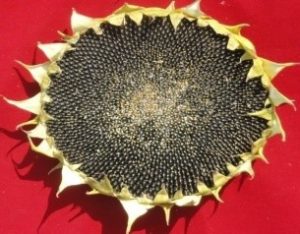 |
| WHEAT | ||
| AKAW-4210-6 | · Suitable for cultivation under IR-LS conditions in Maharashtra State
· Early Maturity & hence wider adaptability to sowing time · Good yield potential (40-42 qt/ha) under IR-LS · Non-lodging and easy thresh ability · Rust resistance · High Iron, Zinc and Manganese content · Good chapatti and bread making quality |
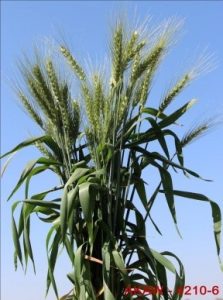 |
Extension Activities and Achievements
Summer School, Winter School, CAS Training organized)
| Sr. No. | Name of Event | Date | Place | No. Participants |
| 1 | VasantraoNaik Seminar on Conventional and Biotechnological Approaches for crop Improvement | 19-20, March, 2015 | Department of Botany, Dr. PDKV, Akola |
200 |
Details of Guest lectures organized for update knowledge of Students
| Topic | Speaker | Date |
| Transcriptomics studies in crop plants | Dr. Vidya Gupta, Head, NCL, Pune | 20-03-2015 |
| Applications of atomic energy in agriculture | ||
| Fellowships and job opportunists in Nuclear Science to Agricultural Post-Graduate | Dr. Manjaya, Scientist, BARC, Mumbai | 15-01-2018 |
| Status of Millets in India | Dr. Bhatt, PC, Small Millets, Bengalaru | 12-12-2017 |
| Status of Wheat Breeding in India | Dr. Saiprasad, Chief Scientist, Regional Wheat Research Station, Indore | 15-12-2017 |
Research Recommendations (Approved in AGRESCO)
| Sr. No | Year |
Recommendation |
| 1 | 2013-14 | Polymer coating @ 3ml/kg seed in combination with flow able thiram @ 2.4ml/kg of Soybean seed before storage is recommended for maintaining the seed quality of Soybean for 12 month storage and higher yield. |
| 2 | 2013-14 | Presowinghydropriming seed treatment for 8 hrs with 1:2 seed water ratio followed by drying at room temperature to normal moisture content (2days) is recommended for expected and uniform field emergence plant stand establishment and improving seed yield by 10 -15 % in pigeonpea. |
| 3 | 2013-14 | It is recommended that for grading of paddy varieties a sieve of 1.4 mm for fine 1.6 mm for coarse variety may be used in place of presently recommended 1.8 mm sieve. |
| 4 | 2014-15 | Two sprays @ 250ppm of Maleic hydrazide, First at 50 days followed by 60 days after sowing is recommended for inducing up to 35 days in green gram |
| 5 | 2014-15 | Two foliar spray of salicylic acid @ 1.50mm (145 gm in 700 ltr of water/ha) at 75 & 105 Days after sowing under rainfed condition of Maharashtra may be given for maximization of cotton yield. |
| 6 | 2017-18 | For higher yield and benefit from green gram two foliar spray of 30 ppm putrescine @ 25 & 40 days after sowing is recommended. (putrescine is dissolve in alcohol) |
| 7 | 2017-18 | For higher yield and benefit from green gram two foliar spray of 40 ppm Chitosan at 25 & 40 days after sowing is recommended. (Chitosan is dissolve in 0.1 N HCL i.e. 8.5 ml HCL in 1 liter of water or latrine acid 20 to 25 ml in 1 liter) |
Publications
Contact Information

Dr. D. V. Durge
Head
Deptt. of Agricultural Botany
Dr. Panjabrao Deshmukh Krishi
Vidyapeeth, Akola

